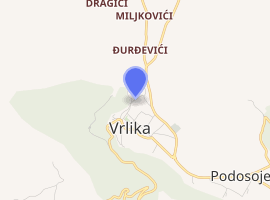Church of St. Nicholas, Vrlika
The Church of Stаint Nicholas (Serbian Cyrillic: Црква Светог Оца Николе) is a Serbian Orthodox church in the town of Vrlika, located in Northern Dalmatia, Croatia.
| Crkva svetog oca Nikole Црква светог оца Николе | |

| |
| 43°54′47″N 16°23′55″E | |
| Location | Vrlika |
|---|---|
| Country | Croatia |
| Denomination | Serbian Orthodox |
| History | |
| Dedication | Saint Nicholas |
| Administration | |
| Archdiocese | Eparchy of Dalmatia |
History
Built in 1618, the Orthodox church dedicated to Saint Nicholas[1][2] is the oldest religious object built in Vrlika. A bell tower was added and consecrated by hieromonk Vikentija (Stojisavljević) from Dragović monastery in 1801 and its current iconostas dates from the mid-19th century.[3]
Throughout the centuries, the church was the target multiple arson attempts during world wars and most recently, the Yugoslav Civil War. On May 28, 1972, the church was severely damaged in a fire set by Croatian nationalists during the Croatian Spring crisis, only to be restored two years later on May 26, 1974.[4] Between 1990–1991, explosives were planted around the church several times by Croatian nationalists.[5]
Starting in 2015, renovations were made to the church with new doors, windows and a new metal staircase leading up to the bell tower. A complete restoration of the church exterior facade was also included in the project which cost approximately one hundred thousand Euros raised by Vrlika's Serbian Orthodox faithful from all around the world.[6]
In August 2018, the Serbian Orthodox inhabitants of Vrlika along with many Vrlika Serbs from the diaspora, congregated in Vrlika to celebrate the 400 year anniversary of the church.[7]
Traditions
Čuvari Hristovog Groba (Serbian: Чувари Хрстовог Гроба; "Guardians of Christ's Grave"). The tradition of Čuvari Hristovog Groba (Serbian: Чувари Хрстовог Гроба; "Guardians of Christ's Grave") is a long held Easter tradition in Vrlika and the Church of Saint Nicholas.[8] Although exact knowledge of when this custom began in Vrlika is not known but, according to oral tradition, the custom is believed to have been brought to Vrlika from Jerusalem during the 16th century[9] The tradition was first mentioned in the church records in 1764.[10]
See also
- Dragović monastery, Serbian Orthodox monastery founded in 1395 near Vrlika
Annotations
- Name: Church of Holy Father Nikolaj (Храм Св. Оца Николаја)
References
- "Pravoslavne crkve u sjevernoj Dalmaciji". Archived from the original on 3 April 2010. Retrieved 8 September 2018.
- "Namjesništvo Splitsko". Archived from the original on 25 January 2013. Retrieved 20 November 2012.
- "Četiri veka hrama Svetog Nikole u Vrlici". srbi hr (in Serbian). 17 August 2018. Retrieved 8 September 2018.
- "Četiri veka hrama Svetog Nikole u Vrlici". srbi hr (in Serbian). 17 August 2018. Retrieved 8 September 2018.
- The Persecution of the Serbs in Croatia, 1990/1991: Documents. Association of the Serbs from Croatia. 1991.
- "Četiri veka hrama Svetog Nikole u Vrlici". srbi hr (in Serbian). 17 August 2018. Retrieved 8 September 2018.
- "Fundraising evening for historic Church on 9 June « Britić". www.ebritic.com. Retrieved 8 September 2018.
- Pravoslavlje. Izdaje Srpska patrijaršija. 2007. p. 128.
- "Oteli su nam Sinjsku alku, ne damo im Čuvare Hristovog groba!".
- "Fotogalerija Vrlički čuvari Hristovog groba". portalnovosti.com. Retrieved 8 September 2018.